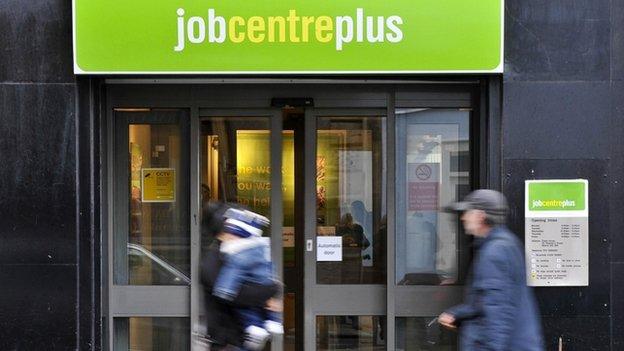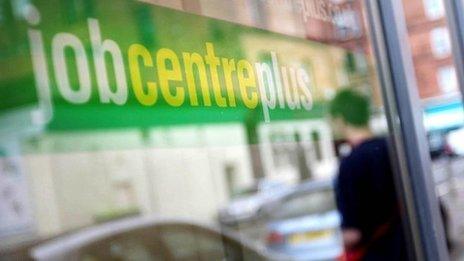Unemployment in Scotland up by 1,000
- Published

Unemployment in Scotland increased by 1,000 to 163,000 between February and April, according to official figures.
The level was down 19,000 compared to the same quarter last year.
The unemployment rate in Scotland is now 5.9%, compared with 5.5% for the UK as a whole.
The labour market statistics also showed employment in Scotland increased by 14,000 to 2,624,000 during the quarter.
The number of people claiming Job Seeker's Allowance (JSA) fell by 1,200 from April to 76,300 in May 2015.
That figure was down by 23,900 on May 2014.
'Near record high'
The claimant count rate remained unchanged over the month at 2.7% - down 0.9%.
The Secretary of State for Scotland, David Mundell, said the figures showed "the creativity, resilience and hard work of so many people and businesses in Scotland".
He added: "The increase in employment sees the number of people in Scotland in work reach a near record high.
"Over the past year employment in Scotland has increased by 53,000 and unemployment has fallen by 19,000.
"The latest economic forecasts also confirm growth will continue this year and next with more jobs being created and wages continuing to rise."
The Scottish government's Fair Work Secretary, Roseanna Cunningham, said the figures pushed Scotland "to the forefront of work to help people into jobs across Europe".
'Female participation'
She added: "Youth unemployment is at its lowest level and rate in six years and female participation in the labour market continues to improve.
"There are also now 74,000 fewer Scots unemployed since the peak of the recession in 2010, great news for the economy, which is also making a difference to the lives of individual Scots.
"Today's news follows a range of activity to support more people into jobs including ensuring our colleges are fully focused on the employability of young people, highlighting the importance of apprenticeships and improved options on childcare to help more women back in the workforce."
But she acknowledged there were areas where further work was needed "as recent quarters have seen small rises in unemployment."
"However, there are areas where further work is needed, particularly as recent quarters have seen small rises in unemployment.
She added: "Much of that change appears to have been caused by people - mostly women - re-entering the labour market following the recession, and as such, the labour market is seeing an influx in the numbers of people seeking jobs."
'Strong message'
Liz Cameron, chief executive of the Scottish Chambers of Commerce, said the figures "pointed towards a strengthening jobs market" with businesses competing hard for the available skills.
However, she added: "We do need to see a strong message from the Chancellor in his summer budget that the UK government is committed to supporting the potential for growth in key sectors.
"Our tourism sector needs to be as competitive as it can be internationally and we would welcome a move by the chancellor to reduce the level of VAT applied to tourism and hospitality activities, as a positive move forward to level the playing field between the UK and other European countries."
Grahame Smith, general secretary of the Scottish Trades Union Congress (STUC), said the statistics were "another mixed bag which emphasise again that the recovery in Scotland's labour market is a slow and uneven process".
He added: "The small increase in unemployment and rise in employment are attributable to another fall in economic inactivity which is now at a historically low level.
"With unemployment, as measured by both level and rate, still significantly higher than before the recession, the key test of the strength of the Scottish labour market over the coming year will be whether people leaving inactivity manage to keep finding jobs.
"The STUC has ongoing concerns over the quality and sustainability of the new jobs being created. Although the real terms increase in wages across the UK is encouraging, there is a very long way to go until wages recover their pre-recession value".
- Published13 May 2015
